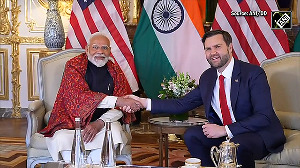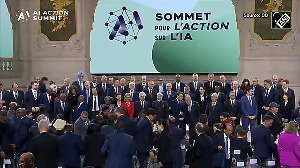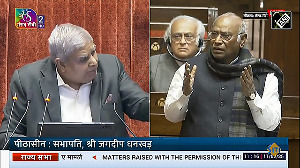A last-ditch attempt to rescue the Doha round of world trade talks is likely to be made towards the end of July at a Geneva meeting of 30 trade ministers from among the 150-member countries of the World Trade Organisation (WTO).
Doha round talks collapsed in Potsdam, Germany, yesterday after trade ministers of the United States, India, Brazil and the European Union (or the G-4), failed to agree on several key issues.
A senior commerce ministry official today said the meeting would be convened between July 20 and 30. "One last ministerial meeting is likely among all the groupings like the G-10, G-20, African states and the EU," he said.
Meanwhile in Geneva, agencies quoted WTO Director General Pascal Lamy as saying that a global free trade deal was still possible. However, Commerce Minister Kamal Nath reiterated at a press conference in New Delhi that India would not compromise the interests of its subsistence farmers.
Indian officials expect little move forward, especially since the US and India are headed for elections in 2008 and 2009, respectively.
Both countries have powerful farm lobbies and any concessions, key to concluding the latest round of trade talks that started in 2001, could prove disastrous for the administration in these countries.
"The Uruguay round of talks took nine years to complete. By that standard, the Doha round still has some years left," officials added.
The Doha round negotiations were slated to be complete by December this year. Nath said the United States had offered to cap its overall spending on trade-distorting farm subsidies at $17 billion, down from an earlier offer of $22.5 billion made nearly two years ago.
Since the US currently spends only $10.8 billion on trade distorting farm subsidies, Nath said, "There is no equity in this, no logic and no fairness".
Doha: What The Fuss Is All About
- Farm Subsidies: Developing countries like India and Brazil want the developed countries to implement deep cuts in the subsidies they pay their farmers. This demand has been refuted by countries like the United States, which has offered to spend $17 billion a year on this head. India says this is far too high
- Farm Tariffs: The European Union has offered a 50 per cent overall cut. The US wants more. Indian officials say the EU and US have probably arrived at an understanding to restrict the cuts to some items, while leaving out "sensitive" products. India, while willing to open up to farm imports, also wants the right to restrict many products to protect the interests of its near 300 million farmers.
- Industrial Goods: The developed world will cut industrial tariffs to 10 per cent and wants developing countries to accept a 15 per cent ceiling for industrial tariffs. This is a sore point with India and others; they feel this is an unfair arrangement and want a 30 per cent ceiling, while EU and US say they can accept 18 per cent for poorer states.







 © 2025
© 2025